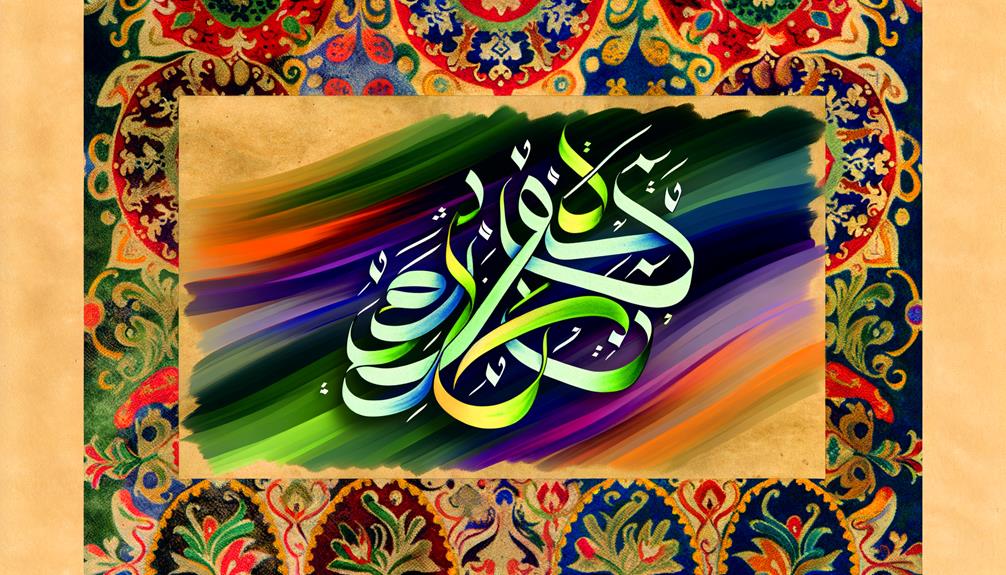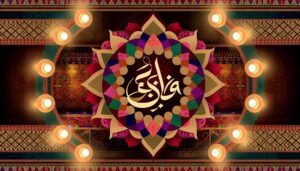Meaning of Name in Urdu
Urdu names are deeply rooted in Persian, Arabic, and Turkish traditions, reflecting centuries of historical, social, and religious influences. They honor virtues, historical figures, and natural beauty.
Names like Muhammad and Fatima not only carry spiritual significance but also embody cultural and moral values from Islamic teachings. Male names often convey strength and leadership, while female names emphasize grace and beauty.
Modern adaptations maintain their profound meanings, balancing heritage with contemporary contexts. By understanding these intricate layers, you'll gain deeper insights into the rich cultural and spiritual heritage carried by Urdu names.

Key Takeaways
- Urdu names often have roots in Persian, Arabic, and Turkish, carrying deep cultural and historical meanings.
- Names in Urdu are chosen for their poetic elegance and reflection of cultural heritage.
- Quranic names in Urdu have profound spiritual meanings linked to Islamic teachings and values.
- Male and female Urdu names emphasize traits like bravery, beauty, and virtue respectively.
- Popular Urdu names like Muhammad and Ayesha are historically significant and symbolically rich.
Historical Significance
Understanding the historical significance of names in Urdu reveals a rich tapestry of cultural heritage and linguistic evolution.
You'll find that many names in Urdu are derived from Persian, Arabic, and Turkish origins, reflecting centuries of cultural intermingling.
Urdu itself evolved from the interactions between native Indian languages and the languages of various invading powers.
For instance, names like "Zainab" and "Ayesha" come from Arabic, while "Shahbaz" has Persian roots.
These names aren't just labels; they encapsulate historical narratives, social values, and religious influences.
When you explore the etymology, you'll discover that each name carries layers of meaning, often linked to virtues, nature, or divine attributes, providing a window into the cultural and spiritual life of past generations.
Cultural Context
In the cultural context, names in Urdu often encapsulate familial aspirations, societal values, and religious beliefs, reflecting a deep interconnection between identity and tradition. Names are not merely labels but embodiments of family hopes and cultural heritage. They often derive from Persian, Arabic, and Turkish origins, carrying meanings that honor virtues, historical figures, or natural beauty. When you choose an Urdu name, you’re often guided by the nuanced connotations and poetic elegance embedded within. In recent years, there has been a growing interest in Urdu names with English meanings, as people seek to bridge the gap between their cultural heritage and the globalized world. This trend reflects a desire to preserve and celebrate Urdu traditions while also honoring the diverse linguistic landscape of the modern world. By choosing Urdu names with English meanings, individuals are able to communicate the richness and depth of their cultural identity to a wider audience.
| Aspect | Example |
|---|---|
| Familial Aspirations | 'Ameena' (trustworthy) |
| Societal Values | 'Adil' (just) |
| Nature | 'Gul' (flower) |
| Historical Figures | 'Salim' (peaceful) |
| Poetic Elegance | 'Shireen' (sweet) |
Understanding these layers enriches your appreciation of Urdu names.
Religious Inspirations
When you explore the significance of names in Urdu through a religious lens, you uncover the profound influence of Quranic names, often chosen for their deep spiritual meaning and connection to Islamic teachings.
Names of prophets hold a special reverence, embodying virtues and moral values that parents hope to instill in their children.
This religious inspiration guarantees that names aren't only identifiers but also carriers of cultural and spiritual heritage.
Quranic Name Significance
Quranic names carry profound religious significance, often embodying virtues and attributes that reflect the core values of Islamic faith and culture. When you choose a Quranic name, you're not just selecting a label but embracing a tradition rooted in deep spiritual meaning.
- Virtuous Attributes: Names like Sadiq (truthful) and Karim (generous) highlight desirable moral qualities.
- Cultural Context: Names such as Aisha and Omar link to significant historical and cultural figures in Islamic history.
- Etymological Insights: Many Quranic names derive from Arabic roots, offering layers of meaning; for instance, the name Noor (light) symbolizes guidance and divine illumination.
Prophetic Name Influence
Similarly, prophetic names like Muhammad and Yusuf carry deep religious inspirations, reflecting the virtues and teachings of the prophets they're named after.
When you name a child Muhammad, you're invoking the qualities of mercy, wisdom, and leadership epitomized by the Prophet Muhammad.
The name Yusuf, rooted in the story of Prophet Yusuf, symbolizes patience, beauty, and resilience.
In Urdu culture, these names aren't just identifiers; they're aspirational, imbued with historical and spiritual significance.
Etymologically, Muhammad means 'praised' and Yusuf means 'God increases.' These names connect you to a rich heritage, encouraging adherence to moral and ethical standards set by these prophets.
Choosing such names is a profound decision, embodying a legacy of faith and virtue.
Popular Urdu Names
When you explore popular Urdu names, you'll find that common male names like Ahmad and Hassan are rich in historical and spiritual significance.
Female names such as Aisha and Fatima not only sound melodious but also carry deep cultural meanings.
Names with beautiful meanings, like Zain (beauty) and Noor (light), reflect the poetic nature of the Urdu language and its emphasis on aesthetics.
Common Male Names
In Urdu-speaking cultures, male names often carry deep historical and religious significance, reflecting a blend of linguistic beauty and cultural heritage. You'll find that many names are derived from Arabic, Persian, and even Sanskrit origins, each with its unique etymology and cultural context.
- Muhammad: Rooted in Arabic, it means 'praised' or 'praiseworthy,' and is highly revered due to its association with the Prophet Muhammad.
- Ahmed: Another name for the Prophet Muhammad, it translates to 'one who constantly thanks God.'
- Ali: Originating from Arabic, it means 'elevated' or 'exalted,' and is often associated with Ali ibn Abi Talib, a significant figure in Islamic history.
These names not only reflect religious devotion but also a deep sense of identity and tradition.
Common Female Names
Just as male names in Urdu-speaking cultures carry profound historical and religious connotations, female names also embody rich linguistic beauty and cultural heritage, often originating from Arabic, Persian, or Sanskrit roots. These names not only reflect noble qualities but also resonate with poetic elegance. For instance, names like Ayesha, Fatima, and Zainab are deeply embedded in Islamic history, while names such as Sania and Zara bring Persian charm and grace. Understanding these names' etymologies offers a glimpse into their cultural significance.
| Name | Origin | Meaning |
|---|---|---|
| Ayesha | Arabic | Alive, Living |
| Fatima | Arabic | To Abstain |
| Zainab | Arabic | Fragrant Flower |
| Sania | Persian | Brilliant |
| Zara | Arabic | Princess |
Exploring these names helps you appreciate the cultural depth and beauty they represent.
Names With Beautiful Meanings
Delving into popular Urdu names, you'll find that many carry meanings imbued with beauty, wisdom, and virtue, reflecting the deep cultural and linguistic heritage from which they originate. These names often encapsulate profound cultural values and historical narratives.
For instance:
- Aisha – Meaning 'alive' or 'living,' it's a name with historical significance, rooted in Islamic tradition.
- Zain – This name signifies 'beauty' and 'grace,' reflecting an appreciation for aesthetic and moral qualities.
- Fatima – Meaning 'captivating,' it's revered due to its association with religious and historical figures.
Each name provides insight into the cultural priorities and linguistic elegance of Urdu-speaking communities, emphasizing the cherished qualities and virtues passed down through generations.
Gender-Specific Meanings
Frequently, the meanings of names in Urdu are gender-specific, reflecting the deep-seated cultural and etymological traditions that delineate male and female identities.
You'll notice that male names often embody traits like strength, bravery, and leadership. For example, names like Asad (lion) and Amir (leader) convey these attributes.
Female names, on the other hand, frequently emphasize grace, beauty, and virtue. Names such as Aisha (alive) and Zahra (flower) illustrate these qualities.
The etymology of these names often stems from Arabic roots, deeply embedded in Islamic culture. Understanding these distinctions offers a glimpse into how language and culture interweave to shape identity and expectation within Urdu-speaking communities.
It's a fascinating interplay of linguistics and societal norms.
Name and Personality Traits
Building on the gender-specific meanings of names, you'll find that these names in Urdu are also believed to influence personality traits, shaping how individuals perceive themselves and are perceived by others. This belief is rooted in cultural traditions and the etymological significance of names.
For example:
- Sana (ثنا): Meaning 'praise,' it often leads to a personality that seeks positivity and appreciation.
- Adeel (عادل): Translating to 'just' or 'fair,' it tends to foster a sense of justice and integrity.
- Zara (زارا): Meaning 'princess,' it may imbue a sense of grace and leadership.
These names carry a deep cultural context, reflecting values and traits esteemed in Urdu-speaking communities. Understanding this connection enriches your grasp of the language and its cultural heritage.
Modern Adaptations
In today's interconnected world, many Urdu names have undergone modern adaptations while still retaining their rich cultural and etymological roots.
You've likely noticed how traditional names like 'Ayesha' become 'Aisha,' blending seamlessly into global contexts without losing their essence. This trend reflects an evolving linguistic landscape where names adapt to diverse phonetic and cultural settings.
For instance, 'Rehman' might be simplified to 'Rahman' for ease of pronunciation internationally. These adaptations maintain the names' deep meanings— 'Ayesha' signifies 'living,' and 'Rehman' means 'merciful.' Despite modern tweaks, these names preserve their heritage, symbolizing a fusion of tradition and contemporary identity.
Understanding these adaptations helps you appreciate the dynamic nature of Urdu naming conventions in a globalized society.
Choosing the Perfect Name
Selecting the perfect name in Urdu involves a thoughtful balance of cultural significance, etymological depth, and personal resonance. Here's how you can approach it:
- Cultural Significance: Consider names that reflect your heritage and traditions. Names like 'Ayesha' or 'Bilal' carry historical and religious importance.
- Etymological Depth: Look into the roots of the name. For instance, 'Zara' means 'princess' in Arabic, adding layers of meaning.
- Personal Resonance: Choose a name that feels right for your child and family. It should evoke positive emotions and a sense of identity.
Conclusion
You'd think naming a child would be simple, right? Just pick something that sounds nice.
But in Urdu, names carry historical weight, cultural depth, and religious significance.
Ironically, the perfect name isn't just about aesthetics; it's a tapestry of meanings and traits, bridging past and present.
So, while you're busy choosing, remember: you're not merely naming a child; you're bestowing a legacy.
It's a small act with monumental implications.






